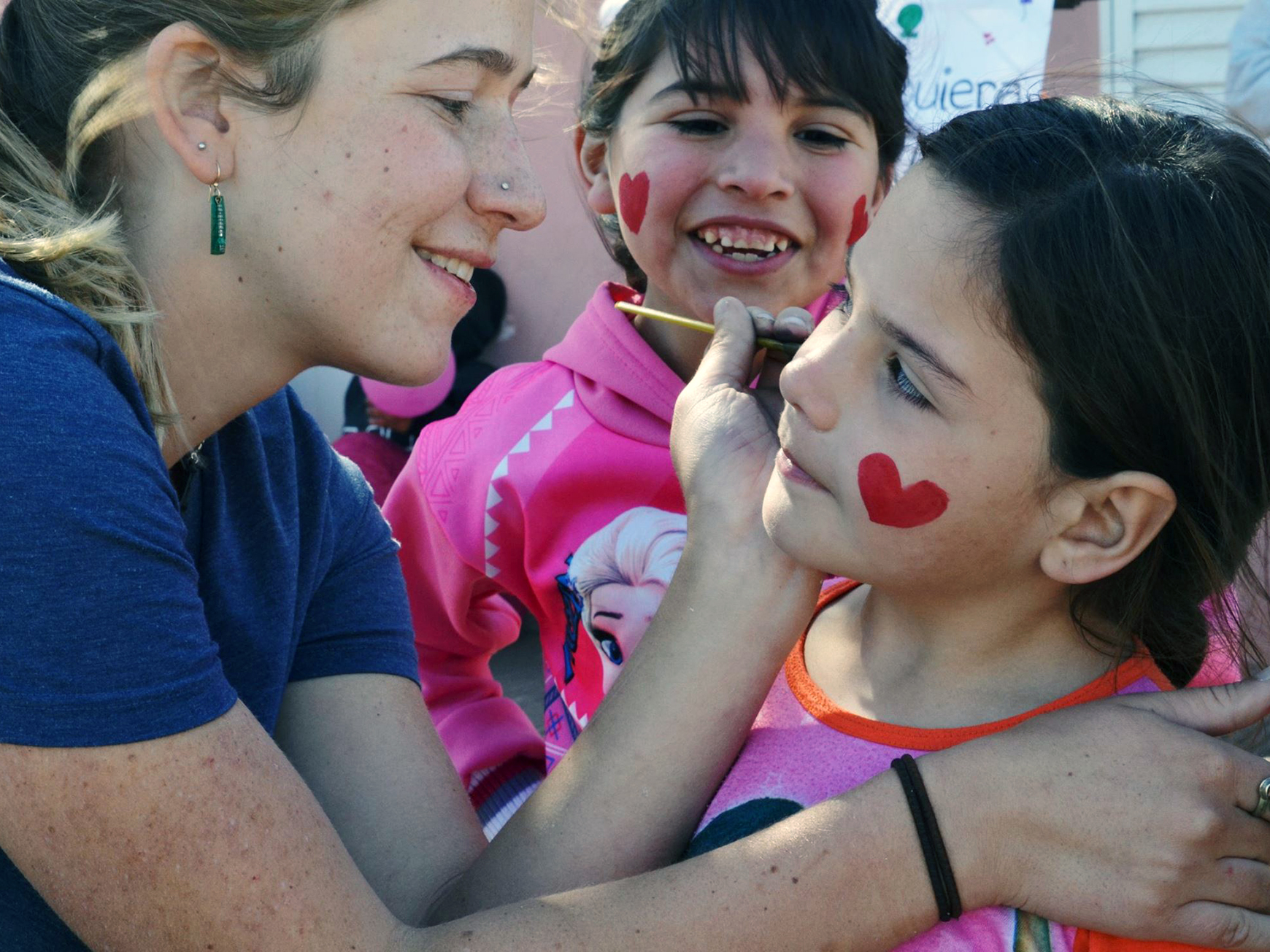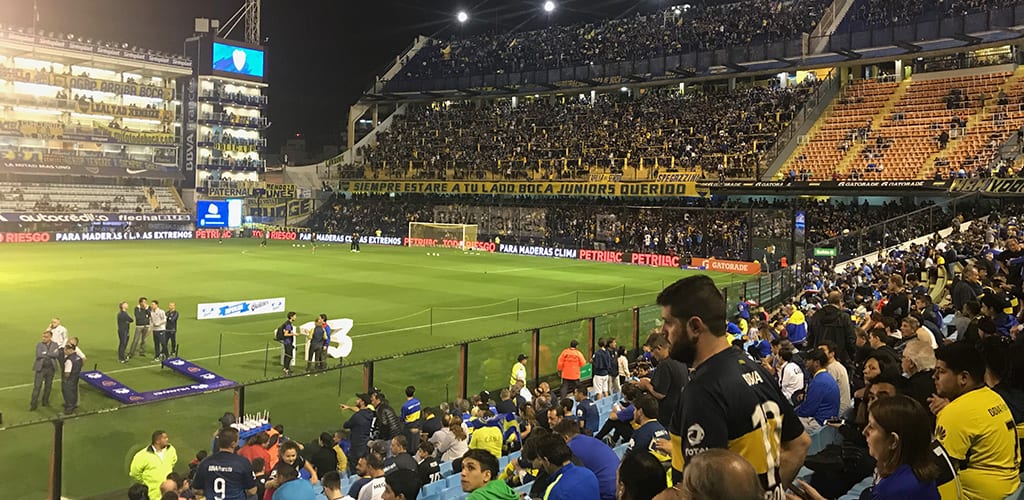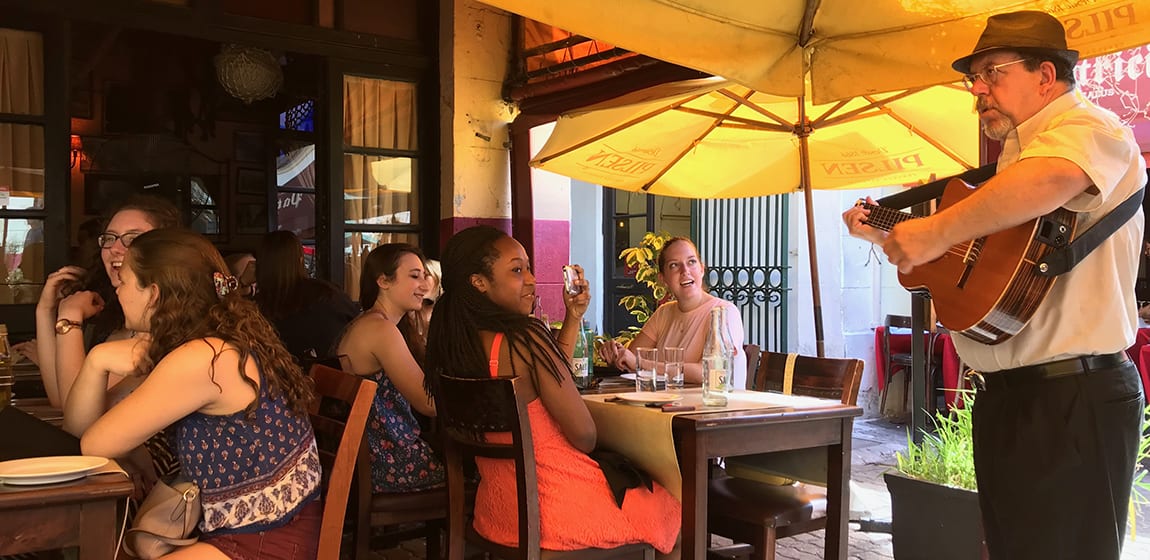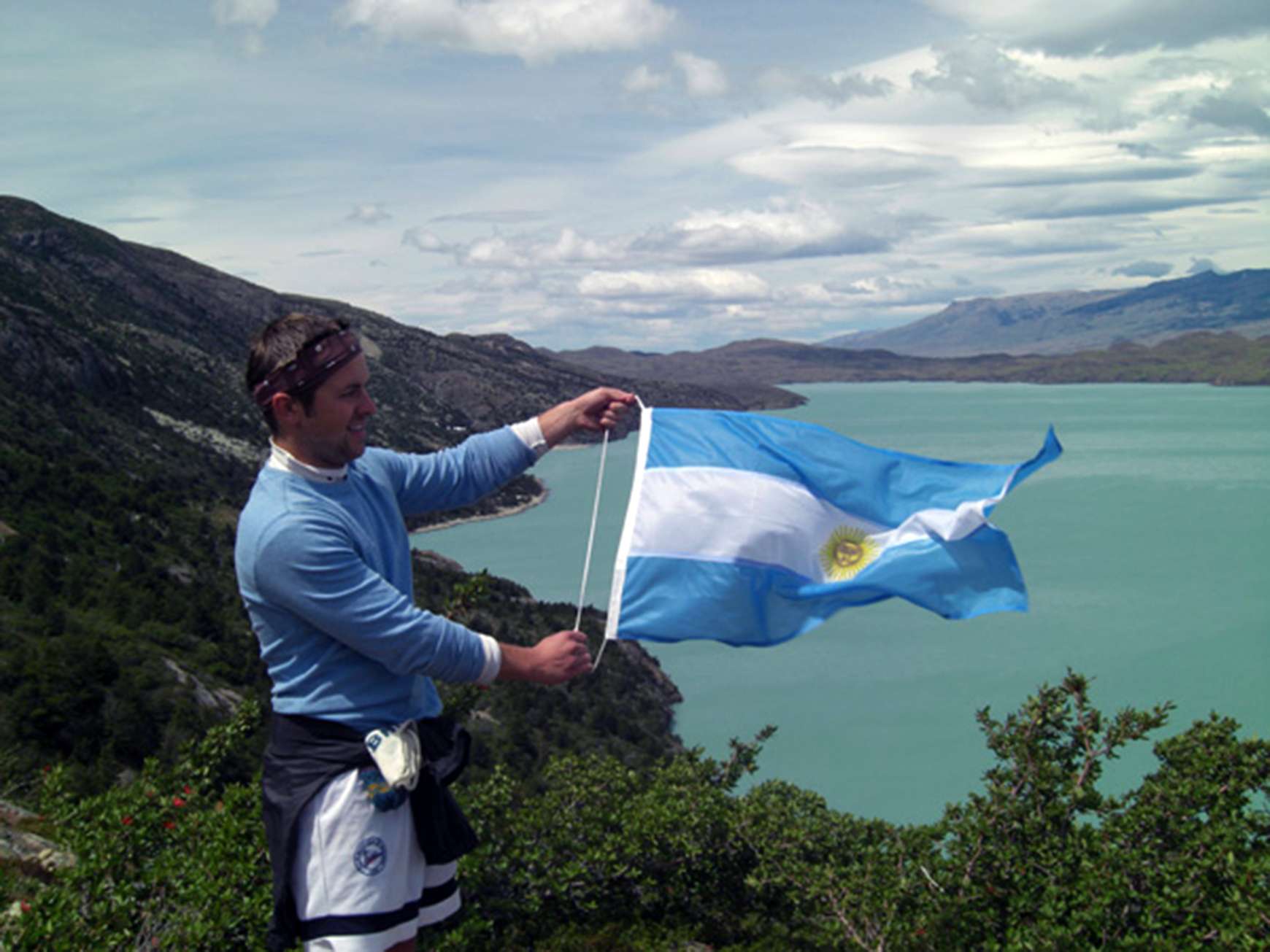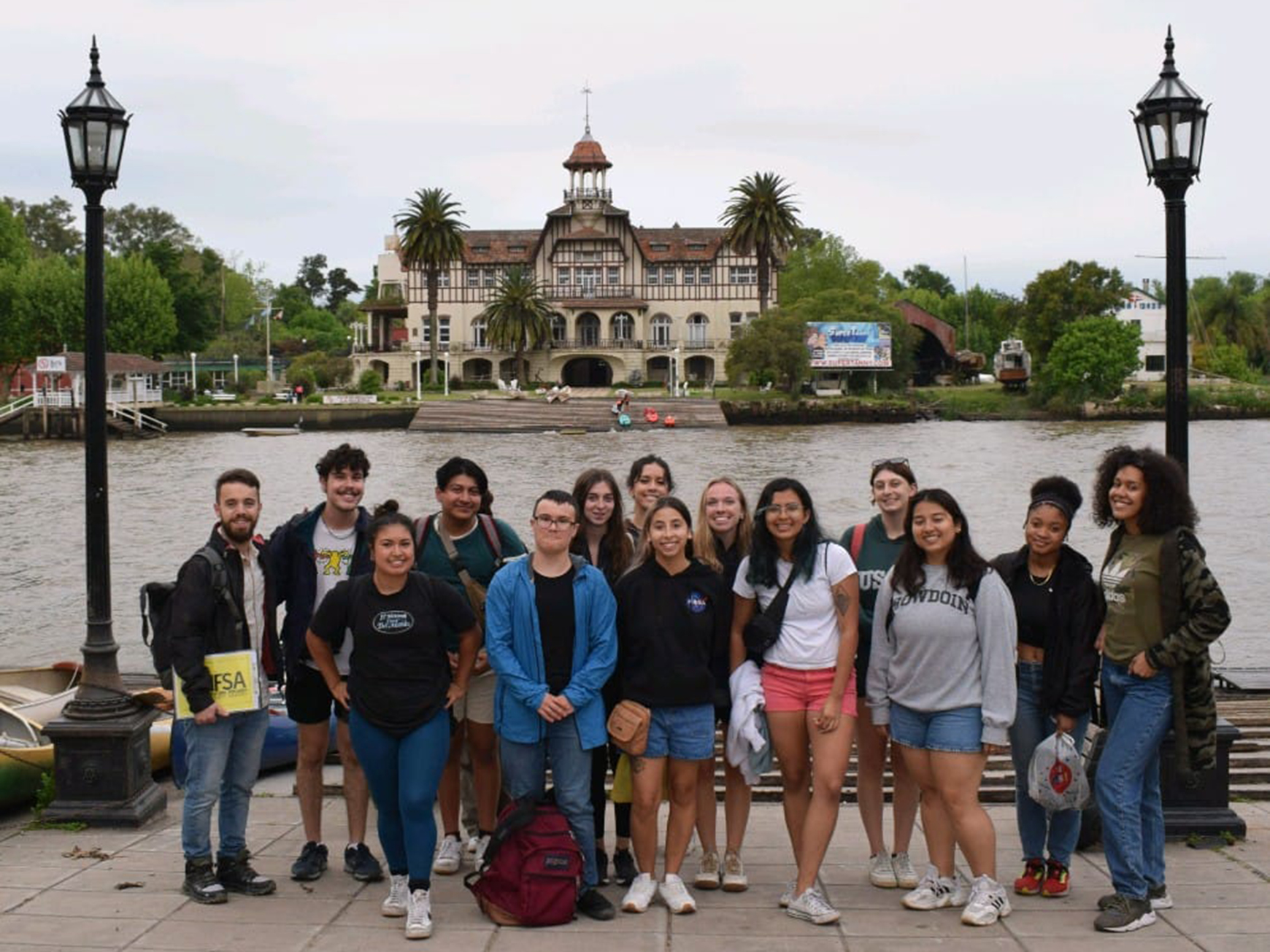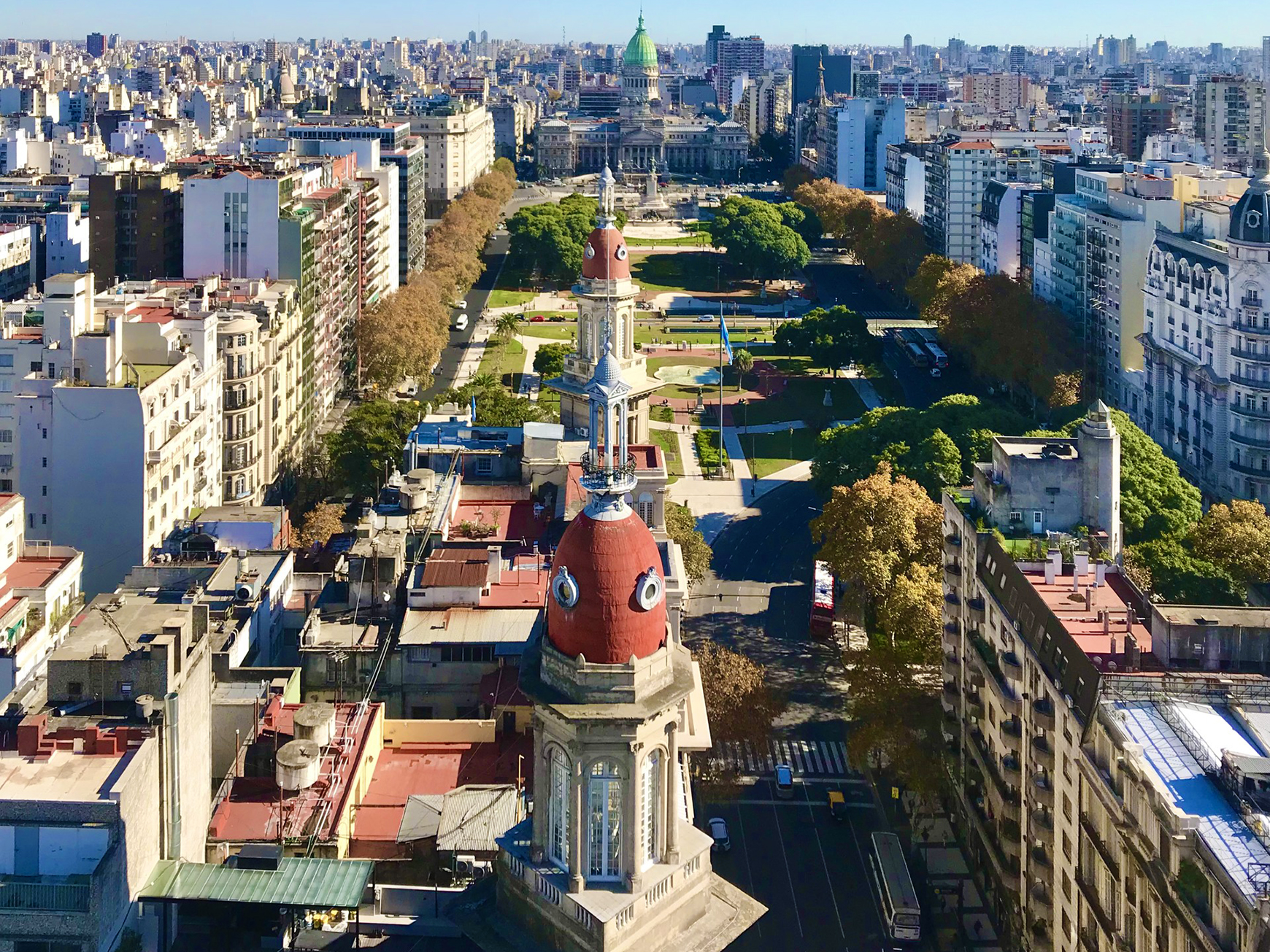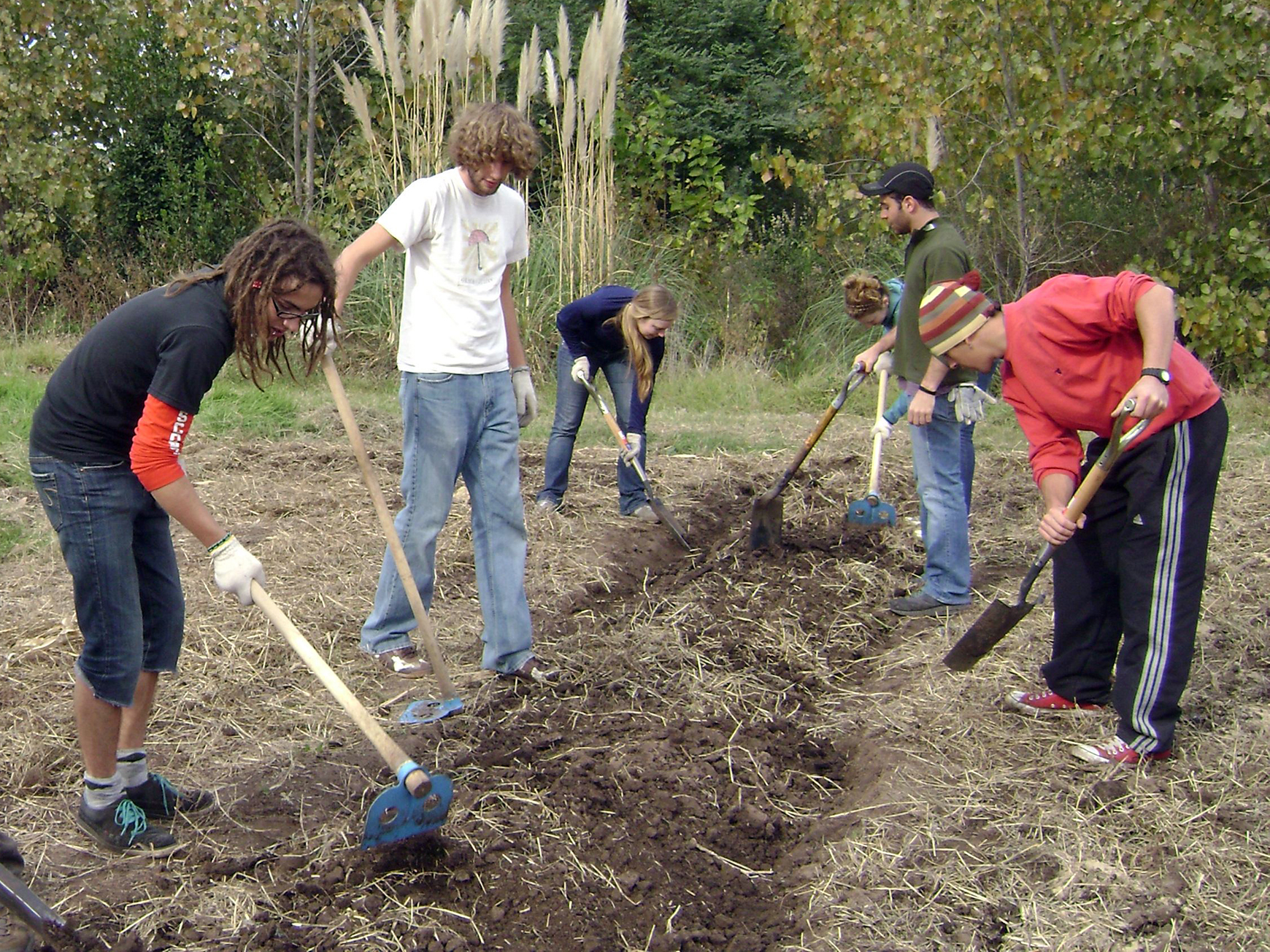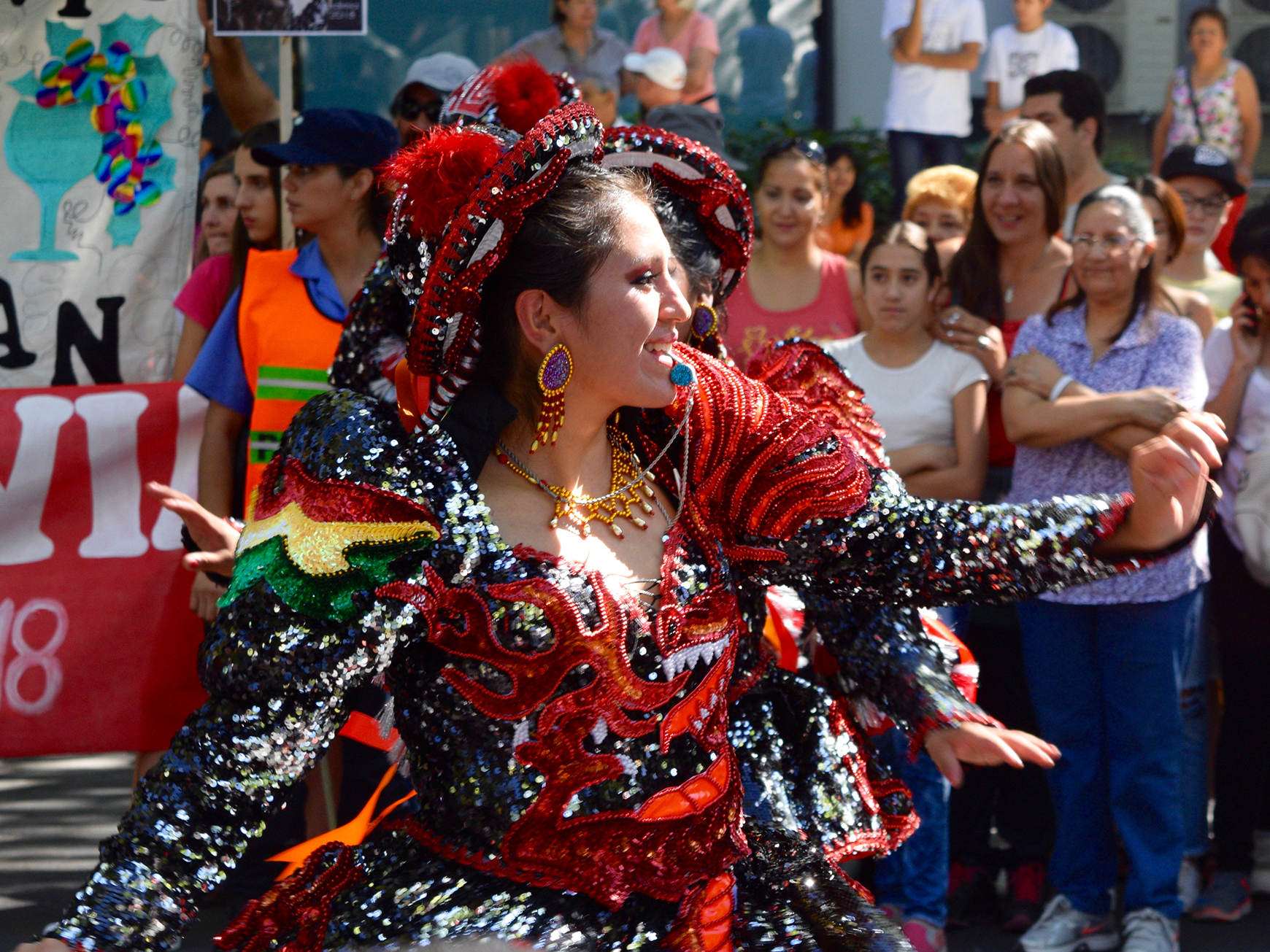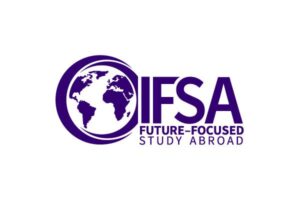Buenos Aires, Argentina
IFSA Study in Buenos Aires
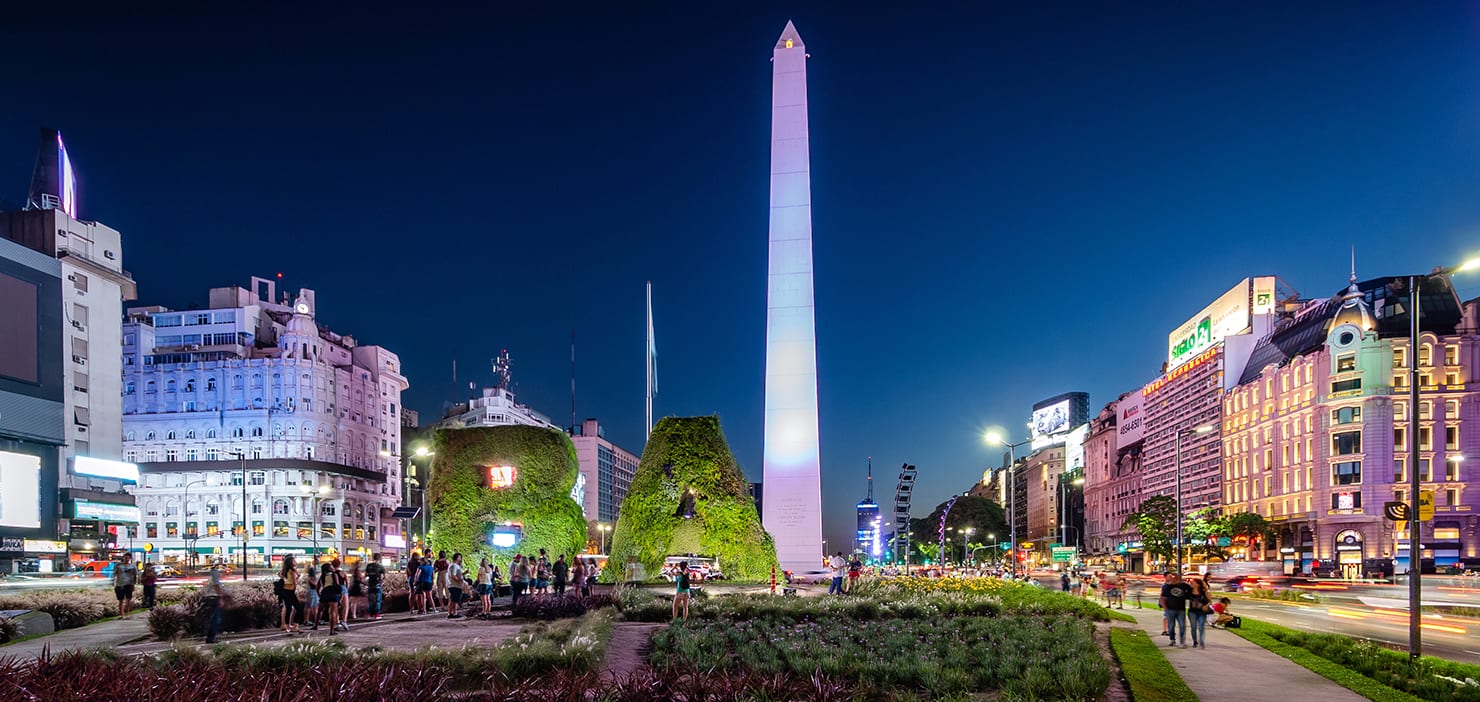

Program Overview
OUR MOST AFFORDABLE ARGENTINE OPTION
Looking for big city living with Latin flair and abundant opportunity to improve your Spanish? Find it in lively Buenos Aires, with our lowest-cost program, open to students with a GPA of 2.0 or higher. Whether you major in business, economics, psychology, neuroscience, or Spanish, a range of IFSA English-taught classes in everything from multicultural psychology to international trade make it easy to gain the credits you need while you get to know a city known for its powerful cultural scene, passion for tango, and fondness for late nights. Option for an internship gives you an insider’s pass to Argentine work culture.
Interested in taking classes at an Argentine university? Explore IFSA Study in Buenos Aires Plus and IFSA Study in Buenos Aires Plus: Psychology and Neuroscience.
This is an exclusive IFSA-Designed Program. Learn more about these affordable programs here.
Details at a Glance
Application deadline
Minimum GPA
2.00
Credit load
12–16
Housing
Apartment/Flat, Single Room Option, Homestay
Instruction language
English
Language prerequisites
None
Visa required?
Yes. Learn More.
Academics
IFSA’s Study in Buenos Aires program provides a compelling curriculum that’s taught in English and focuses on business, economics, psychology, neuroscience, and Spanish. Crafted for U.S. degree requirements and contemporary hot topics, you can select four to five IFSA classes for a total of 12-15 U.S. semester credit hours.
All classes are open to all students without prerequisites. Classes may vary by semester based on faculty availability and student interest.
Argentina and Human Rights
Language of Instruction: English
The class comprises theoretical and practical contents of human rights and modernity. The main objective is to cover the historization of human rights, through an analysis of modernity and capitalism. It focuses on the history of human rights in Argentina from the independence revolutionary era to the return of the democratic government in the 1980s. Finally, the class reviews the experience of human rights in Argentina through two specific ways: The 1976 military coup, the detention camps, and the transition to democracy; Through the visit to communal memory spaces related to the systemic and institutional violation of human rights during the 1976-1983 military governments. (3 U.S. semester credit hours)
Brain, Drugs, and Addiction
Language of Instruction: English
This class examines substance use and its impact on how the brain functions from the perspective of neuropsychology. The concept of drugs, normal brain functioning, and the impact of their consumption at the neuroanatomical and neurophysiological levels will be analyzed. Students will address social, psychological, cultural, and biological aspects that are linked to the deterioration of the nervous system, as well as the differences between occasional use, problematic use, and addiction. Finally, a comparison will be made in the substance use and its impact approach between Argentina and the U.S. (3 U.S. semester credit hours)
Directed Research
Language of Instruction: English
This class offers a unique opportunity for students to delve deeply into host context research projects. Students will be guided through projects that are both feasible in the study abroad context and relevant to their broader intellectual interests. The class is structured through regular individual meetings with a faculty mentor to discuss the formation and execution of a research plan and, depending on the specific project, the possibility to conduct field- or internet-based research. At the end of the semester, students present a formal research paper. (3 U.S. semester credit hours)
Food, Culture, and Argentine Society
Language of Instruction: English
Understanding food’s role in culture, in society, is therefore a local and global concern. This class examines all of these issues from anthropological and sociological perspectives and draws on the rich culinary situation of the course in Buenos Aires throughout. Living in a time where food is no longer limited to home and restaurant kitchens, this course explores the place food has in a globalized world. (3 U.S. semester credit hours)
Globalization and Economic Challenges in Latin America
Language of Instruction: English
Starting from economic changes in Latin America in the 1960s through future economic scenarios for Argentina in the 21st century, this class examines globalization’s historic impact as economies and financial systems become more interconnected. Supporting topics ranging from climate change, commercial conflicts, and strategic trade alliances with China, the U.S., and other regions, a series of field visits allow students to gain firsthand experience with the economic challenges and opportunities globalization presents in and around Buenos Aires. (3 U.S. semester credit hours)
International Internship Seminar
Language of Instruction: English
Students are placed in individual internships but collectively take part in the seminar to prepare for the experience, understand expectations, set personal objectives, identify and strengthen specific skills, critically reflect on their progress, share experiences, and learn from each other throughout their term. Students develop a deeper understanding of themselves, their professional areas, and Argentine work culture. In this seminar, which is focused on application of theory to practice, students gain real-world work experience while developing intercultural agility—skills and experiences that are critically important to personal, academic, and professional success. (3 U.S. semester credit hours)
International Political Economy
Language of Instruction: English
This class explores theoretical issues and illustrative case studies related to international political economy. Students examine ways domestic and international politics affect relations between states by examining the role of government in the production, distribution, and consumption of resources. Students also learn to apply core concepts and theories in international political economy to case materials. (3 U.S. semester credit hours)
International Trade
Language of Instruction: English
This class gives students the conceptual basis and the necessary tools for understanding modern international trade at the intermediate level. Topics include gains from trade in a classical world; the modern theory of international trade; factor price equalization; empirical tests and extensions of the pure theory model; economic growth and international trade; the nature and effects of protection; motives and welfare effects of factor movements. Each topic will be followed with examples and case studies mainly under the context of Argentina’s international trade with the U.S., China, and the rest of the world. (3 U.S. semester credit hours)
Intervention Strategies in Mental Health
Language of Instruction: English
This class covers strategies of intervention in mental health. Some psychologists in Argentina have defined “mental health” as a comprehensive and inclusive state of actions capable of producing welfare rooted in the insertion of the individual in their functional milieu. Together students learn about mental health, intervention, and effective strategies, while exploring the applications across diverse situations and populations. Identifying effective preventive and therapeutic strategies is crucial to establishing public policies which contribute to mental well-being at individual, family, community, and social levels. (3 U.S. semester credit hours)
Multicultural Psychology
Language of Instruction: English
This class will examine how “cultural traditions and social practices regulate, express, and transform the human psyche, resulting less in psychic unity for humankind than in ethnic divergences in mind, self, and emotion” (Shweder, 1991, p. 91). It will explore how psychology is socially constructed and will pay particular attention to the following factors as they influence human development: oppression, language, acculturation, economic concerns, racism and prejudice, sociopolitical factors, child-rearing practices, religious practices, family structure and dynamics, and cultural values and attitudes. We will explore the meaning of culture and how it affects our thoughts and behavior. (3 U.S. semester credit hours)
The Psychology of Crime and Justice
Language of Instruction: English
This class introduces the broad range of theoretical and methodological approaches to forensic psychology and criminal justice. Is a criminal mind born as such, or is the criminal a product of their environment? What role do governments and societies play in facing crime? Students will gain a foundation in relevant areas of psychology and psychoanalysis and then examine how that science interacts with real-world judicial systems. Additional topics will include punishment, treatment, and rehabilitation; assessment and intervention; and how dimensions of privilege can impact perceptions of crime and justice in conscious and subconscious ways. (3 U.S. semester credit hours)
Social Cognition and Neuroscience
Language of Instruction: English
Integrating insights from cognitive psychology, social cognition, and cognitive neuroscience, this class explores how we understand other people’s behavior. Students will examine the organization of the brain and its functions from a descriptive dimension, as well as from a global and systemic perspective to understand how we construct social cognitions and their effect on behavior and social interaction. Intending to make the theoretical contents easily understandable, the topics will be approached from practical examples, both from the local culture (e.g., fútbol, mate) and from global social examples (e.g., the Holocaust, bullying). (3 U.S. semester credit hours)
Sports and Identity in Argentina
Language of Instruction: English
This class draws on the approaches of anthropology, sociology, history, and other disciplines to bring new perspectives on some of the most popular sports in Argentina like soccer (“football”), rugby, and polo. What is the connection between cultural identity and the sports world? How do popular sports impact on nationalism in Argentina? Gender and equality in sports? We will examine how socio-cultural, political, and economic issues are understood in sporting terms and concepts: the hero; merit and sacrifice; individual identity and team identity, the vindication as society through sports victories and even the idea of sports as a path to social mobility. (3 U.S. semester credit hours)
IFSA LANGUAGE CLASSES
Developing skills in a foreign language can profoundly impact your life personally and professionally. Though language study is not required, students frequently report their Spanish language class as one of their favorites and the one they applied most outside the classroom.
Essential Spanish
Language of Instruction: English and Spanish
If you’ve never studied Spanish before, you can take this optional, introductory class in Spanish language and Argentine culture. By introducing key words and phrases and venturing out into the city to practice them, you’ll gain essential skills to communicate effectively and navigate in a new culture. (1 U.S. semester credit hour)
Spanish Language
Language of Instruction: Spanish
No prior language study is required. A mandatory prearrival language assessment will determine your appropriate language level. (3 U.S. semester credit hours)
DIRECTED RESEARCH
Engage in individualized field research with faculty experts on a contemporary issue of interest. Regular meetings with faculty will assist in the formation and execution of research plans, and they will guide you on how to thoughtfully and critically integrate academic research with experiential learning. You will sharpen your written and oral communication skills through the development of articulate and comprehensive research that is respectful to the sensitivities of the local culture.
If you chose to research live human subjects, live animals or another topic that is deemed by IFSA to be required to be reviewed by the Institutional Research Board (IRB) at your home institution, then you will have to file your project with your home institution’s IRB board and submit your result to IFSA. Your IFSA Enrollment Counselor will review your application materials to help determine if you must file with IRB.
There are limited research opportunities available in English. For more detailed information and examples of previous student placements, contact your IFSA Enrollment Counselor.
VOLUNTEERING
The IFSA Buenos Aires Global Flagship organizes non-credit bearing volunteer opportunities throughout the semester, usually as one-time activities or events. On occasion, more sustained involvement may be possible. Opportunities vary, but may include agricultural work on an organic farm, assisting students through tutoring or playing games designed to build social skills, or providing services for the homeless population or LGBTQ+ community in Buenos Aires.
INTERNSHIPS
IFSA internships include real-world work experience, along with developing intercultural skills and experiences that are key to personal, academic, and professional success. Expect to devote a total of 120 hours working with your host organization, with supervision from your seminar instructor, coordinated by on-site IFSA team members. In addition, interns complete the International Internship Seminar for 3 U.S. semester credit hours. Internships are not remunerated.
Students have interned at NGOs, local corporations, and government organizations in Buenos Aires.
Your goals are carefully considered, tailoring the placement process to ensure the best possible fit. Keep in mind that final placements depend on your skills (including your Spanish language abilities), prior experience, and availability. Although every effort is made to match your placement with your preferred field or area of business, it can’t be guaranteed. Internships are available in English and Spanish. Please talk to your IFSA Enrollment Counselor about opportunities to conduct your placement in Spanish.
Application. After you submit your application, resume, and IFSA Internship Intent Form, an IFSA Enrollment Counselor and an on-site IFSA Team member will work with you to identify your professional strengths, review your goals, and refine your internship interests to establish a match. From there, you’ll have an interview in Buenos Aires with your potential internship host. You will be provided with tips and resources to prepare for your interview.
Sample Placements. The following are examples of internships IFSA students have recently completed. Placement options vary from term to term.
- Plan and implement initiatives to improve the living conditions of vulnerable groups
- Prepare proposals for media campaigns and meetings to elevate awareness on violence against women and the LGBTQ+ community
- Examine and source historical archives on humanitarian crimes to raise awareness and support human rights
- Assist and support differently abled children through educational and recreational activities
- Participate in projects focused on eliminating the gender gap in social, political and economic arenas
- Coordinate interactive activities to strengthen the relationship between the immigrant and local community, and society at large
APPLICATION REQUIREMENTS
Eligibility
- You must be at least 18 years of age. Students under 18 may be accepted on a case-by-case basis.
- You must be currently attending or recently graduated from a U.S. or Canadian community college, technical college, two-year college, four-year college, or four-year university.
- You must have completed at least one (1) full-time semester of study at your home institution before the beginning of the term.
Recommendation Letter
Not required.
Language Requirement
No requirement.
TRANSCRIPT
Upon completion of your program, IFSA will send an official Butler University transcript to your home university with your coursework converted to the U.S. semester credit hour system. You will also have access to an unofficial transcript in your IFSA Student Portal. The transcript reflects classes taken, credits attempted, and grades earned during your term abroad. This service is included in your study abroad program at no additional cost. See our Transcripts page for more information.
Excursions
Activities and excursions are designed to pull you into the communities you visit and encourage cultural connections of every kind. There’s no extra fee to participate in these optional outings—everything is included in your program fee.
Below are examples from previous terms; outings may be different for your program. We’ll make every effort to run them all, but sometimes things we can’t control, such as local regulations and health protocols, get in the way. As result, we cannot guarantee activities and excursions.
Activities
- City-as-Text: This guided walking tour will introduce you to Porteño society and culture through the varied artistic expressions that can be found throughout Buenos Aires including street art, dance, theater, and music.
- La Boca Neighborhood Tour: The oldest site of Italian migration to Buenos Aires, the famous and colorful La Boca neighborhood is home to one of the city’s most popular soccer teams, Club Atlético Boca Juniors. The tour will include a visit to La Bombonera stadium to appreciate the importance of soccer as popular expression in Argentina.
- Colón Theatre Performance: Attend a performance at Colón Theatre, one of the most important opera houses in the world, to learn about the influence and experience the importance of art in Argentina.
- Pandemic and Politics: This event will engage you in a discussion about how the pandemic was handled and the effects it has had on Argentina. A guest lecturer will address specific issues around how the population lived through this worldwide event.
Excursions
- Tigre Delta del Parana Trip: This overnight excursion to the Tigre Delta includes a boat ride and offers a glimpse into the contrasts between wetlands and island living and the big-city life in Buenos Aires.
- Eco-Village Trip: This day-long trip to an eco-village explores the traditional agricultural mode of production and delves into issues such as organic and self-sustainable farming, local consumption, and the dynamics of multinational farming and feedlot production.
Housing and Meals
Housing
Apartment/Flat, Single Room Option, HomestayMeals
Most IncludedDetails
Buenos Aires students can opt for a homestay with a local family or—for an additional fee—live in city apartments. Homestays provide opportunity for additional support and connection as you get to know your hosts. If you are adventurous or independent, living in a shared apartment allows you to soak up local culture, practice Spanish language skills, and connect with porteños (city residents). Both options allow you to experience the lifestyle of this amazing city.
HOMESTAYS: WHO’S AT HOME?
We place students with carefully screened families in safe neighborhoods, with up to two IFSA students per family. Many families have been hosting IFSA students for years. Often, they have adult children who have left home, and enjoy having young people around.
You might live with a retired couple or a retired woman, perhaps with visits from young grandchildren. Your hosts might have high school-age children and a grandparent living with them. Or you might join a single mom who shares her home with her young daughter, with another adult child living nearby.
- Location: Typically in the Recoleta, Palermo, Belgrano, Villa Crespo, Almagro, and Caballito neighborhoods for easy access to public transportation, the IFSA Program Center, universities, shops, and cafes.
- Commute: Whether on foot or via bus or metro, your travel time to the IFSA Program Center will be no more than 40 minutes.
- Living space: Only a few hosts have houses; many live in apartments. Expect to have your own bedroom, though it will likely be smaller than a typical U.S. space. Students share a bathroom with other family members. Your host will provide a desk or other suitable place to study.
- Host family: Few families are fluent in English, but most can communicate. We do our best to place students without Spanish skills with English-speaking families.
- Meals: Two meals a day included. Students occasionally eat out with friends and buy snacks independently. Hosts appreciate advance notice if you will not be present for breakfast or dinner.
- Other details: Your host will give you access to laundry facilities once a week. Keep in mind that washing machines tend to have smaller capacity here than in the U.S.
APARTMENTS
Students who choose this option live in modern, furnished apartments selected by IFSA in the Palermo Chico neighborhood. Palermo Chico is part of the larger Palermo area in the northeast part of the city. It’s a safe neighborhood, known for diversity, green spaces, and upscale restaurants and shops.
There are two options. You can share a two-bedroom apartment with one other IFSA student or choose a single studio space with kitchen and bathroom. Please keep in mind that both apartment options include an additional fee.
Sample apartment housing
Take a look at Cabello 3620 to see what your Buenos Aires housing might be like:
- Location: Palermo Chico neighborhood.
- Living space: Two students share an apartment with two bedrooms, one bathroom, kitchen, and living space. Bedding, linens, towels, and basic kitchenware provided.
- Meals: No meals provided. Students prepare or purchase their own food.
- Other details: Wi-Fi included. 24/7 staff and security. Laundry facilities on-site.
- Commute: Catch the bus out front or around the block, or walk three blocks to the metro station. Travel time to our IFSA Program Center is 25 to 30 minutes by bus.
- Nearby: Beautiful greenspaces, including Bosques de Palermo (also called Parque Tres de Febrero; bigger than New York City’s Central Park). Open-air markets. Public transportation. Museum of Latin American Art. Evita Museum. Embassies and historic residences.
Dates and Fees
Get Started
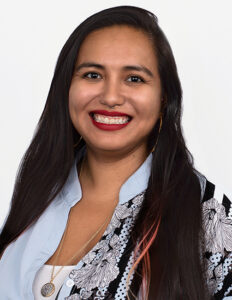
Selena Rincon
Enrollment Counselor

